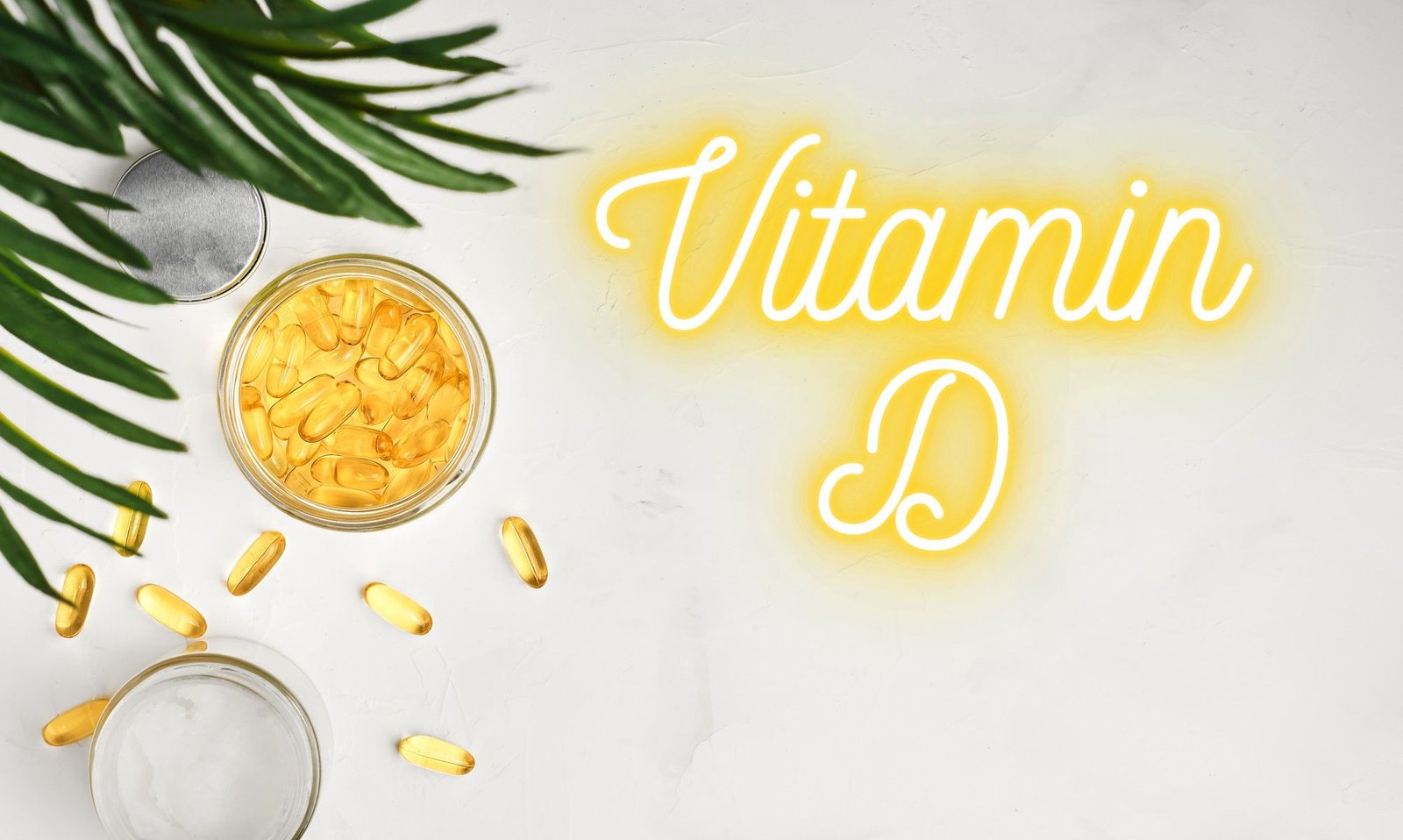A brief overview about how Vitamin D works – Its important to understand first:
Vitamin D is a fat-soluble vitamin that is essential for several processes in the body. It plays a vital role in maintaining healthy bones, teeth, and muscles, as well as supporting the immune system and reducing inflammation. Vitamin D works in the body through a complex series of processes, which are outlined below.
Vitamin D synthesis: The primary source of vitamin D is through the skin’s exposure to ultraviolet (UV) rays from the sun. When the skin is exposed to UV radiation, it triggers the production of vitamin D3 (cholecalciferol), which is the active form of vitamin D in the body.
Transport and activation: Once vitamin D3 is produced, it is transported to the liver, where it is converted to 25-hydroxyvitamin D (25(OH)D). This is the circulating form of vitamin D in the body and is used to determine vitamin D status. From the liver, 25(OH)D is transported to the kidneys, where it is converted to the active form of vitamin D, known as 1,25-dihydroxyvitamin D (1,25(OH)2D).
Calcium and phosphate regulation: The main function of vitamin D in the body is to regulate the absorption and utilization of calcium and phosphate. Active vitamin D increases calcium absorption in the gut, which helps to maintain normal calcium levels in the blood. Vitamin D also regulates the levels of phosphate in the blood, which is essential for healthy bones and teeth.
Immune system function: Vitamin D is also important for immune system function. It helps to regulate the immune response, reduces inflammation, and helps to fight off infections.
Cell growth and differentiation: Vitamin D is also involved in cell growth and differentiation, which is important for maintaining healthy tissues and organs.
In summary, vitamin D plays a crucial role in several processes in the body, including bone and muscle health, immune system function, and cell growth and differentiation. It is essential to maintain adequate vitamin D levels in the body to support overall health and well-being.
Also you need to understand one important part of human body system which is base for all types of health issues and treatment process: Metabolism
Metabolism is the set of chemical processes that occur in living organisms to maintain life. It involves the conversion of nutrients and other substances into energy and the building blocks needed for growth, repair, and maintenance of the body.
Metabolism can be broken down into two main processes: catabolism and anabolism. Catabolism is the process of breaking down complex molecules, such as carbohydrates, proteins, and fats, into simpler molecules that can be used for energy. This process releases energy in the form of ATP(adenosine triphosphate), which can be used by cells to carry out various functions. Anabolism, on the other hand, is the process of building more complex molecules, such as proteins and nucleic acids, from simpler molecules. This process requires energy, which is usually obtained from ATP generated through catabolism.
The metabolism of nutrients occurs through various pathways, depending on the type of nutrient and the needs of the body. For example, carbohydrates are converted into glucose, which can be used as a source of energy for cells, while fats are broken down into fatty acids and glycerol, which can also be used as an energy source. Proteins are broken down into amino acids, which can be used for energy, but are also used to build and repair tissues in the body.
The metabolism of nutrients is regulated by various hormones, such as insulin, glucagon, and cortisol, which help to maintain a balance of nutrients in the body. The metabolism also requires various enzymes and coenzymes, which catalyze the chemical reactions involved in the conversion of nutrients into energy and building blocks.
Overall, metabolism is a complex and essential process that enables the body to maintain its functions and respond to changes in the environment.
What are the vegetarian sources of Vitamin D – that supports Vitamin D intake naturally:
Vitamin D is an essential nutrient that plays an important role in maintaining overall health and well-being. It helps the body absorb calcium and maintain healthy bones and teeth, and also supports the immune system and can improve mood. While the primary source of vitamin D is sunlight, it can also be found in a variety of foods, including some that are suitable for vegetarians.
It may be necessary to take a vitamin D supplement to ensure you are getting enough of this important nutrient. As always, it is recommended to speak with a healthcare professional before starting any new supplement regimen.
For vegetarians, it is important to note that most dietary sources of vitamin D come from animal-based products such as fatty fish, eggs, and dairy products. However, there are also several vegetarian sources of vitamin D that can help you meet your daily needs. Here are some of the best vegetarian sources of vitamin D:
- Mushrooms: Certain types of mushrooms, such as portobello, shiitake, and morel mushrooms, contain vitamin D. This is because they can produce vitamin D when exposed to sunlight or ultraviolet light. Eating just one cup of sliced portobello mushrooms can provide up to 400 IU of vitamin D, which is more than the daily recommended intake for most adults.
- Fortified plant-based milks: Many plant-based milks, such as soy, almond, and oat milk, are fortified with vitamin D. Check the label to make sure the milk you choose contains vitamin D, as not all brands may be fortified. Drinking just one cup of fortified plant-based milk can provide up to 120 IU of vitamin D.
- Fortified breakfast cereals: Some breakfast cereals are also fortified with vitamin D. Check the label to make sure the cereal you choose contains vitamin D, and be sure to choose a brand that is low in added sugars. Eating just one serving of fortified breakfast cereal can provide up to 100 IU of vitamin D.
- Tofu: Some brands of tofu are fortified with vitamin D. Check the label to make sure the tofu you choose contains vitamin D, and be sure to choose a brand that is low in sodium. Eating just one serving of fortified tofu can provide up to 80 IU of vitamin D.
- Egg yolks: While eggs are not suitable for vegans, lacto-ovo vegetarians can benefit from the vitamin D found in egg yolks. Eating just one large egg yolk can provide up to 20 IU of vitamin D.
- Fortified orange juice: Some brands of orange juice are fortified with vitamin D. Drinking one cup of fortified orange juice can provide up to 100 IU of vitamin D.
- Fortified plant-based yogurts: Some brands of plant-based yogurts are fortified with vitamin D. Eating one serving of fortified plant-based yogurt can provide up to 150 IU of vitamin D.
- Plant-based meat alternatives: Some brands of plant-based meat alternatives, such as veggie burgers and sausages, are fortified with vitamin D. Eating one serving of fortified plant-based meat can provide up to 100 IU of vitamin D.
- Sunflower seeds: Sunflower seeds are a good source of vitamin D, containing up to 40 IU per ounce. They also provide other important nutrients, such as vitamin E and magnesium.
- Oily fish alternatives: While fatty fish is a primary source of vitamin D for non-vegetarians, some plant-based alternatives contain similar amounts of vitamin D. For example, seaweed and algae-based supplements can provide up to 2000 IU of vitamin D per serving.
It’s important to note that vitamin D can be difficult to obtain in sufficient amounts through diet alone, especially for vegetarians. During the winter months or if you have limited exposure to sunlight, a supplement may be necessary. However, incorporating some of these vegetarian sources of vitamin D into your diet can still be beneficial for overall health and well-being.
If you found this suitable then please do share and support our readings. Thank You!








Leave a Reply